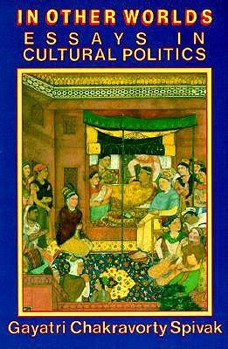In Other Worlds: Essays in Cultural Politics
Select Format
Select Condition 
Book Overview
In this classic work, Gayatri Chakravorty Spivak, one of the leading and most influential cultural theorists working today, analyzes the relationship between language, women and culture in both... This description may be from another edition of this product.
Format:Paperback
Language:English
ISBN:0415900026
ISBN13:9780415900027
Release Date:June 1987
Publisher:Routledge
Length:336 Pages
Weight:1.18 lbs.
Dimensions:1.0" x 6.1" x 9.0"
Related Subjects
Anthropology Art Criticism & Theory Cultural Education & Reference Feminist Theory Gender Studies History & Criticism Movements & Periods Politics & Government Politics & Social Sciences Pop Culture Social Science Social Sciences Social Theory Sociology Themes Women in Art Women's StudiesCustomer Reviews
1 rating
In Other Worlds
Published by Thriftbooks.com User , 20 years ago
In Other Worlds: Essays in Cultural Politics, Gayatri Spivak is interested in finding new ways to apply Marxism and Feminism to literary texts. She argues that the traditional ways of reading texts and the traditional canon of knowledge leave out many important voices from Other Worlds. Her essays focus on the growing need for academic departments to become increasingly integrated in order to better understand the world's political, social and economic issues that hegemonically maintain the cultural and economic hierarchy. Spivak argues that the positions and ways of knowing from within Euro-American universities have a direct and overwhelming influence on the ways ideological and economic imperialism is imposed on the "Third World". This is important because, as Spivak suggests, the task of coming to terms with Euro-American imperialism can not be accomplished within departmental boundaries. Instead, the boundaries that serve to separate disciplines and create "specialists" in any given area need to be broadened to inform all aspects of the social and economic situations. Coming from a Feminist, Marxist and deconstructionist framework, Spivak shows how categories can help to place people, but should not be used as absolute boundaries of discourse. Throughout her essays, Spivak turns to Jacques Derrida, Roland Barthes, and other intellectuals to suggest an increased need for a deconstructionist theory of discourse regarding not just literature, but all texts. She calls attention to the need for a deconstructionist framework within the academia because she believes that that is the only way we will be able to see how ideologies and ways of knowing in developed nations directly affect less developed nations. From a feminist perspective, Spivak sees the Marxian framework as being insufficient in developing an understanding about the mode of production, use value, exchange value and surplus value in regards to the womb. This, she suggests in an important site for the liberation of the female body in society. She believes that the female body has been left out of the mode of production, and therefore does not gain the same esteem for the labor it endures. In the chapter, Feminism and Critical Theory, Spivak asks what the consequences of giving housework an exchange value would be on social relations and the female position within the family. Spivak suggests that this question can be talked about in terms of "alienation". She argues against the presumption that laborers are always separated from their products and that is the reason they feel alienated from society. This is because she sees this framework as leaving out one of the most fundamental and important relationships of the laborer to their production, which she sees as being the woman's labor in the womb and the production of her child. Although she explains that child does not have an exchange value, she still considers the child to be a product of the woman's labor. She further shows how i







